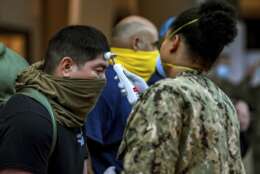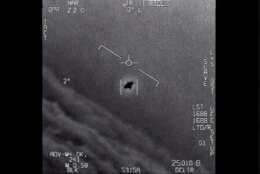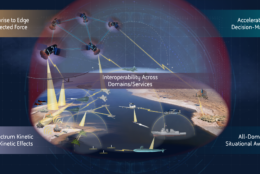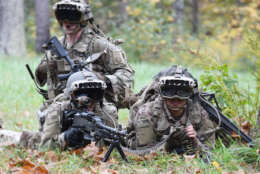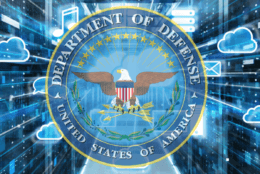Defense
-
The move exempts tens of thousands of federal contractors from the federal vaccine mandate.
November 24, 2021 -
In today's Federal Newscast, the Defense Department is creating a new office that will look into Unidentified Aerial Phenomena.
November 24, 2021 -
American Roll-On Roll-Off Carrier Group, which won and then lost the multibillion dollar award following an earlier round of protests, said it has lodged a new challenge with the Government Accountability Office.
November 24, 2021 -
Tabletop wargames and big military exercises usually focus on more high-level leadership and strategy, but in the potentially degraded environments of the future squad leaders and lower level commanders will be the ones calling the shots.
November 23, 2021 -
Steve Jameson, director and solution architect for BAE Systems Intelligence & Security, writes that systems integrators will play a key role in helping DoD manage the JADO complexity.
November 23, 2021 -
The Center for Government Contracting at George Mason University won a contract to help the Undersecretary of Defense for Research and Engineering review the contracting activities of DARPA.
November 19, 2021 -
In today's Federal Newscast, the White House says it supports the idea of a “basic needs allowance” for low-income military members, but wants more time to decide how much.
November 19, 2021 -
DoD picks Amazon, Microsoft, Google and Oracle for multibillion dollar project to replace JEDI Cloud
The decision followed several months of market research, and represented a change from DoD’s initial plans for the contract.
November 19, 2021 -
Assuming the $6.2 billion award survives the bid protest stage, DoD's first step will be to start integrating HomeSafe's technology with government systems.
November 18, 2021 -
The Pentagon will increase housing payments for troops in key areas and look into ways to combat hunger across the force.
November 17, 2021 -
What if hackers were able interrupt military airplanes or tanks? Such platforms present their own challenges for data gathering and protection.
November 17, 2021 -
Vice Adm. Paul Thomas, deputy commandant for Mission Support at the Coast Guard, told the House Coast Guard and Maritime Transportation subcommittee that the service is investing what funds it does have in resiliency and its workforce.
November 16, 2021 -
DHS was concerned the Pentagon's approach was too "heavy-handed." Now, officials think "CMMC 2.0" might leave gaps in contractor cybersecurity.
November 16, 2021 -
In today's Federal Newscast, the Defense authorization bill has been stalled amid infrastructure and reconciliation talks, but the must-pass legislation could see some movement soon.
November 16, 2021 -
Christopher Barnhurst, executive deputy director for DISA, said the agency is actively experimenting with other forms of multifactor authentication, which will eventually tie into the DoD’s zero trust construct, Thunderdome.
November 15, 2021

